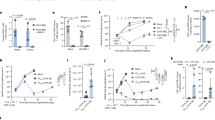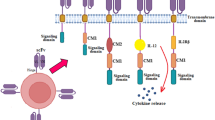Abstract
K6, an influenza-specific cytotoxic T (Tc)-cell clone derived from C3H/He mice, was Dk-restricted. Further analysis showed that K6 also recognized Dd and Dq as allotargets. The clonal nature of the three recognition specificities was confirmed by cold-target cell inhibition. After extensive in vitro selection, K6 lost the ability to lyse Dd cells while retaining both other specificities. The role of the Lyt-2 molecule in antigen-specific self-H-2-restricted vs allospecific recognition was investigated by inhibition with the Lyt-2-specific monoclonal antibody 53-6.7. Both activities were proportionately inhibited, indicating that the Lyt-2 molecule is equally important for both recognition specificities of this Tc-cell clone.
Similar content being viewed by others
References
Askonas, B. A. and Lin, Y-L.: An influenza specific T-killer clone is restricted to H-2L dand cross-reacts with D kregion. Immunogenetics 16: 83–87, 1982
Askonas, B. A., Mullbacher, A., and Ashman, R. B.: Cytotoxic T-memory cells in virus infection and the specificity of helper T cells. Immunology 45: 79–84, 1982
Ben-Nun, A., Lando, Z., Dorf, M. E., and Burakoff, S. J.: Analysis of cross-reactive antigen-specific T cell clones. J. Exp. Med. 157: 2147–2153, 1983
Braciale, T. J., Andrew, M. E., and Braciale, V. L.: Simultaneous expression of H-2-restricted and alloreactive recognition by a cloned line of influenza virus-specific cytotoxic T lymphocytes. J. Exp. Med. 153: 1371–1376, 1981
Finberg, R., Burakoff, S., Cantor, H., and Benacerraf, B.: Biological significance of alloreactivity: T cells stimulated by Sendai virus-coated syngeneic cells specifically lyse allogeneic target cells. Proc. Natl. Acad. Sci. U.S.A. 75: 5145–5149, 1978
Gaston, J. S. H., Rickinson, A. B., and Epstein, M. A.: Cross-reactivity of self-HLA-restricted Epstein-Barr virus-specific cytotoxic T lymphocytes for allo-HLA determinants. J. Exp. Med. 158: 1804–1821, 1983
Götze, D., Nadeau, J., Wakeland, E. K., Berry, R. J., Bonhomme, F., Egorov, I. K., Hjorth, J. P., Hoogstraal, H., Vives, J., Winking, H., and Klein, J.: Histocompatibility-2 system in wild mice. X. Frequencies of H-2 and Ia antigens in wild mice from Europe and Africa. J. Immunol. 124: 2675–2681, 1980
Harris, D. T., Macdonald H. R., and Cerottini, J-C.: Antigen recognition by H-2-restricted cytolytic T lymphocytes is not mediated by two independent receptors. J. Exp. Med. 159: 330–335, 1984
Heber-Katz, E., Schwartz, R. H., Matis, L. A., Hannum, C., Fairwell, T., Appella, E., and Hansburg, D.: Contribution of antigen-presenting cell major histocompatibility complex gene products to the specificity of antigen-induced T cell activation. J. Exp. Med. 155: 1086–1099, 1982
Hunig, T. R. and Bevan, M. J. Antigen recognition by cloned cytotoxic T lymphocytes follows rules predicted by the altered-self hypothesis. J. Exp. Med. 155: 111–125, 1982
Kappler, J. W., Skidmore, B., White, J., and Marrack, P.: Antigen-inducible, H-2 restricted, interleukin-2-producing T cell hybridomas. Lack of independent antigen and H-2 recognition. J Exp. Med. 153: 1198–1214, 1981
Ledbetter, J. A. and Herzenberg, L. A.: Xenogeneic monoclonal antibodies to mouse lymphoid differentiation antigens. Immunol. Rev. 47: 63–90, 1979
Lindahl, K. F. and Wilson, D. B.: Histocompatibility antigen-activated cytotoxic T lymphocytes II. Estimates of the frequency and specificity of precursors. J. Exp. Med. 145: 508–522, 1977
Macdonald, H. R., Glasebrook, A. L., Bron, C., Kelso, A., and Cerottini, J-C.: Clonal heterogeneity in the functional requirement for Lyt-2/3 molecules on cytotoxic T lymphocytes (CTL): possible implication for the affinity of CTL antigen receptors. Immunol. Rev. 68: 89–115, 1982
Mullbacher, A. and Blanden, R. V.: Cross-reactivity patterns of marine cytotoxic T lymphocytes. Cell. Immunol. 43: 70–81, 1979
Mullbacher, A., Blanden, R. V., and Brenan, M.: Neonatal tolerance of major histocompatibility complex antigens alters Ir gene control of the cytotoxic T cell response to vaccinia virus. J. Exp. Med. 157: 1324–1338, 1983
Ozato, K. and Sachs, D. H.: Monoclonal antibodies to mouse MHC antigens III. Hybridoma antibodies reacting to antigens of the H-2b haplotype reveal genetic control of isotype expression. J. Immunol. 126: 317–321, 1981
Pfizenmaier, K., Jung, H., Kurrle, R., Rollinghoff, M., and Wagner, H.: Anti H-2Dd alloreactivity mediated by herpes simplex virus specific cytotoxic H-2k T lymphocytes is associated with H-2Dk. Immunogenetics 10: 395–404, 1980
Schwartz, R. H. and Sredni, B.: Alloreactivity of antigen-specific T cell clones. In C. G. Fathman and F. W. Fitch (eds): Isolation, Characterization and Utilization of T Lymphocyte Clones, pp. 375–384, Academic Press, New York, 1982
Stringfellow, M., Wraith, D. C., and Askonas, B. A.: Cytotoxic T-cell recognition of influenza-infected target cells varies in different H-2 kmouse strains. Immunogenetics 18: 177–181, 1983
Stukart, M. J., Boes, J., and Melief, C. J. M.: Mutations in H-2K binfluence the specificity of alloreactive effector cells included in the repertoire of H-2D b-restricted cytotoxic T lymphocytes against Moloney Leukaemia virus. Immunogenetics 17: 427–439, 1983
Townsend, A. R. M., Taylor, P. M., Mellor, A. L., and Askonas, B. A.: Recognition of Db and Kb gene products by influenza-specific cytotoxic T cells. Immunogenetics 17: 283–294, 1983
von Boehmer, H., Hengartner, H., Nabholz, M., Lenhardt, W., Schreier, M., and Haas, W.: Fine specificity of a continuously growing killer cell clone specific for H-Y antigen. Eur. J. Inimunol. 9: 592–597, 1979
Weiss, A., Brunner, K. T., Macdonald, H. R., and Cerottini, J-C.: Antigen specificity of the cytolytic T lymphocyte response to murine sarcoma virus induced tumors. J. Exp. Med. 152: 1210–1225, 1980
Wraith, D. C., Holtkamp, B., and Askonas, B. A.: Loss of serological determinants does not affect recognition of H-2Kk target cells by an influenza-specific cytotoxic T cell clone. Eur. J. Immunol. 13: 762–766, 1983
Zinkernagel, R. M. and Doherty, P. C.: Restriction of in vitro T cell mediated cytotoxicity in lymphocytec choriomeningitis within a syngeneic or semiallogeneic system. Nature 248: 701–702, 1974
Zweerink, H. J., Courtneidge, S. A., Skehel, J. J., Crumpton, M. J., and Askonas, B. A.: Cytotoxic T-cells kill influenza virus infected cells but do not distinguish between serologically distinct type A viruses. Nature 267: 354–356, 1977
Author information
Authors and Affiliations
Rights and permissions
About this article
Cite this article
Wraith, D.C. Dk-restricted antiinfluenza cytotoxic t-cell clone loses one of its two alloreactivities. Immunogenetics 20, 131–139 (1984). https://doi.org/10.1007/BF00364485
Received:
Revised:
Issue Date:
DOI: https://doi.org/10.1007/BF00364485




